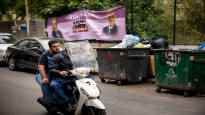The security situation is particularly flammable in Tripoli. The army has been ordered to guard the city on election day.
BEIRUT / TRIPOLI Lebanon and the parliamentary elections on Sunday will be rudely assessed Error from Kahawag.
– I don’t trust anyone in this country. I will not vote. I have never voted, Kahawagi says.
He is sitting in a cafe on Tripoli’s seafront. Tripoli is Lebanon’s second largest city and the most miserable Kolkka in the afflicted country.
Tripoli has a record unemployment rate of over 60 percent. Many townspeople no longer dare to go out at all in the dark for fear of being robbed.
Tripoli is now considered a particularly explosive city. There is a shipwreck off the coast of Tripoli in international waters three weeks ago. Nearly 50 people drowned in Turma.
A boat carrying young Tripoli and Syrians fleeing despair and misery collided with a ship from the Lebanese Coast Guard and sank. The mourning and truth-seeking Tripoli clashed violently with Lebanese security forces.
Since then, the city’s atmosphere has become even more electronic.
On Saturday, on the way from Tripoli to Beirut, this was reflected in the fact that an endless hose of army transport vehicles hit the waterway. The machine guns were on the roof of several cars today.
The army has been ordered to maintain order in Tripoli in today’s parliamentary elections.
Expensive campaigns and hungry children
The elections are being held in the midst of an unprecedented economic downturn in Lebanon that has lasted for three years.
The Lebanese pound has been in a downward spiral. It lost more than 90 percent of its value between 2019 and 2021 and caused hyperinflation in the country. The price of food is far too high for many.
The economic collapse was further fueled by a massive explosion in the port area of Beirut in August 2020.
Deliveries of vital medicines to pharmacies are sporadic, electricity flows a few hours a day, waste collection is tangled and there is a shortage of clean water. The list of problems in everyday life is endless.
Three out of four citizens live below the poverty line. This part of the people does not have enough food. 30 percent of children go to bed hungry.
– Politicians come to the people only during elections. Otherwise, they will not be seen among the people, Hiba Kahawagi says.
The election, in particular, has increased people’s rage against politicians because, in the midst of all the misery, politicians can afford to run very expensive campaigns with radio and TV commercials and huge roadside signs. Votes are bought with food and money.
A system reinforced by religions
Where Hiba Kahawagi has never voted, so is another Tripoli Mrad Helou has voted so far.
– I will not vote now. I do not trust the current situation.
Mrad Helou says people will only be able to trust the political system once the constitution is amended. He wants to get rid of the division of political power between religious groups.
– Change can begin when religious groups stop demanding their part every now and then.
In the Lebanese electoral system, people vote within their own religious groups. That is why elections do not usually change the balance of power in a 128-seat parliament.
Lebanon’s main power-sharing religious groups are the Maronite Christians, Sunnis, and Shiites, a practically Iranian-backed Hezbollah organization. The practice is for the president to be a Maronite Christian, the Prime Minister a Sunni, and the Speaker of Parliament a Shiite.
A young man from Beirut Anis Amer like the old lord of Tripoli, wants to get rid of the supremacy of the denominations. He thinks everyone should have their own beliefs, but it shouldn’t mark boundaries between people.
“Filling every job and all things don’t have to be based on religious divisions,” says Anis Amer.
Does the young man have a surprise in the youth?
There is also movement within religious groups. There are significantly more young independent candidates than in the previous 2018 elections.
The street demonstrations of 2019 were a march of youth and a moment of political awakening for many university students. Tired of rising prices, unemployment, corruption and specifically religious divisions, young people took to the streets less than three years ago and clashed with the police.
This so-called “revolutionary movement” has raised young people on the candidate lists for change. They are especially among the Maronite Christians and, to some extent, the Sunnis.
Lebanese political analysts estimate that there is a small surprise boy in these young people. On the other hand, a rigid system folds the sharpest point of change.
– If there was someone trustworthy who wanted change, then one could vote for it, says a young man from Beirut Jana Abbasand will not vote.
So the cry of young people is not quite ubiquitous.
– I see that my own family is going to vote for the same politicians as before. That is why I do not think it is worth participating in the whole thing.
The Sunnis boycotted and Hezbollah thanks
Another source of uncertainty in this election is that a key Sunni figure and multiple Prime Minister Saad al-Hariri withdrew from politics in the winter. At the same time, he instructed Sunnis to boycott the election.
Since then, other Sunni politicians have softened the group’s position. However, anti-election sentiment has become even more widespread and turnout is expected to remain subdued.
This is considered to favor Shiites and Hezbollah, which traditionally gets their own supporters well into the urn.
